Schmitt C.B. (ed.) The Cambridge History of Renaissance Philosophy
Подождите немного. Документ загружается.

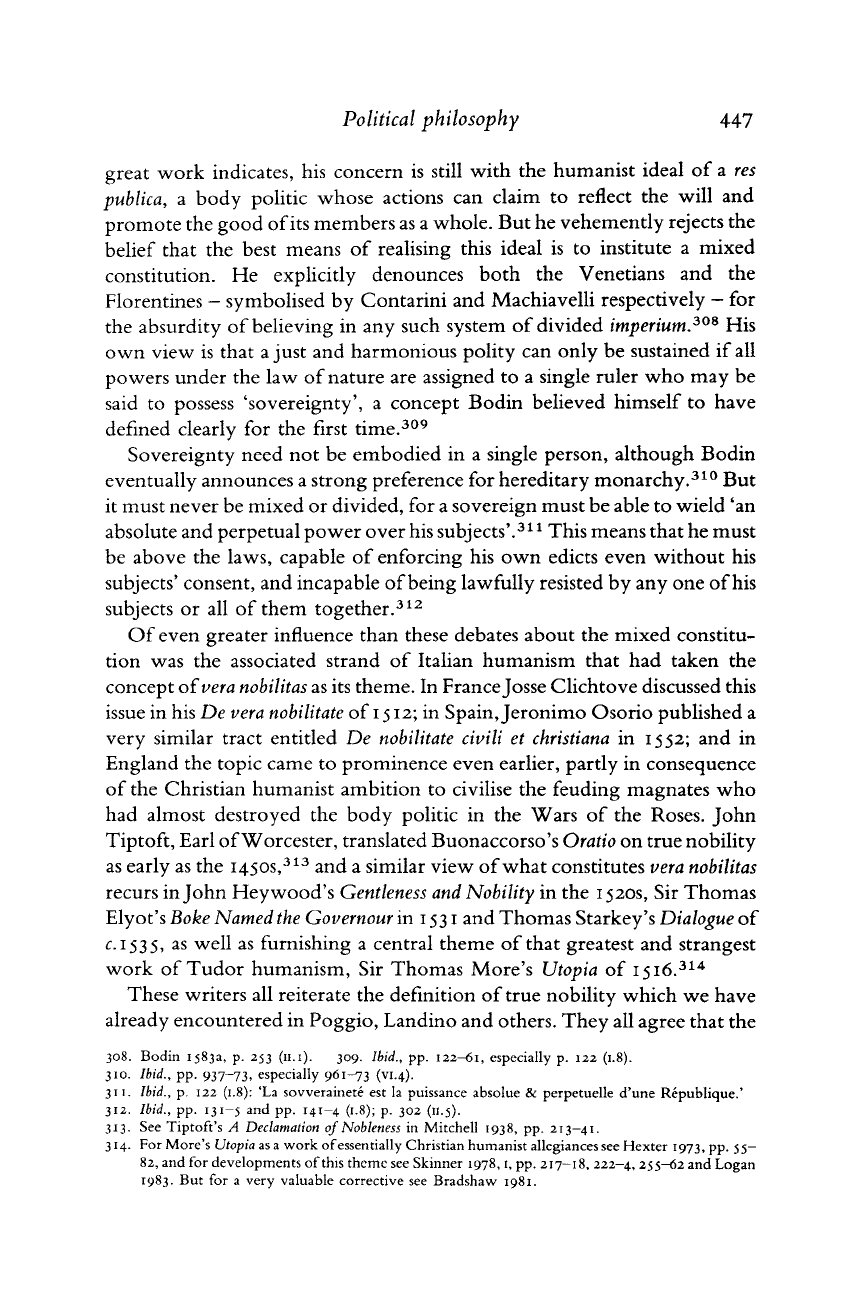
Political
philosophy
447
great
work indicates, his concern is
still
with
the humanist ideal of a res
publica,
a body politic
whose
actions can claim to reflect the
will
and
promote the good
of
its members as a
whole.
But he vehemently rejects the
belief that the best means of realising this ideal is to institute a mixed
constitution. He explicitly denounces both the Venetians and the
Florentines -
symbolised
by Contarini and Machiavelli respectively - for
the absurdity of
believing
in any such system of
divided
imperium.
30S
His
own
view
is that
a
just and harmonious polity can
only
be sustained if all
powers under the law of
nature
are assigned to a
single
ruler who may be
said to
possess
'sovereignty', a concept Bodin
believed
himself to have
defined
clearly for the first time.
309
Sovereignty need not be embodied in a
single
person, although Bodin
eventually announces a strong preference for hereditary monarchy.
310
But
it must never be mixed or divided, for a sovereign must be able to
wield
'an
absolute and perpetual power over his subjects'.
311
This means that he must
be above the laws, capable of enforcing his own edicts
even
without his
subjects' consent, and incapable
of
being
lawfully
resisted by any one
of
his
subjects or all of them together.
312
Of
even
greater influence than these debates about the mixed constitu-
tion was the associated strand of Italian humanism that had taken the
concept
of
vera
nobilitas
as its theme. In
France
Josse
Clichtove discussed this
issue
in his De
vera
nobilitate
of
1512;
in Spain,
Jeronimo
Osorio
published
a
very similar
tract
entitled De
nobilitate
civili
et
Christiana
in
1552;
and in
England the topic came to prominence
even
earlier, partly in consequence
of
the Christian humanist ambition to
civilise
the
feuding
magnates who
had almost destroyed the body politic in the
Wars
of the Roses. John
Tip toft,
Earl
of
Worcester,
translated Buonaccorso's
Oratio
on true nobility
as early as the
1450s,
313
and a similar
view
of
what constitutes
vera
nobilitas
recurs
in
John
Hey
wood's
Gentleness
and Nobility in the
1520s,
Sir Thomas
Elyot's
Boke
Named
the
Governour
in
1531
and Thomas Starkey's
Dialogue
of
c.i
53
5,
as
well
as furnishing a central theme of that greatest and strangest
work of Tudor humanism, Sir Thomas More's
Utopia
of
1516.
314
These writers all reiterate the
definition
of
true
nobility which we have
already
encountered in Poggio, Landino and others. They all agree that the
308.
Bodin
1583a, p. 253
(11.1).
309. Ibid., pp. 122-61,
especially
p. 122
(1.8).
310. Ibid., pp. 937-73,
especially
961-73
(vi.4).
311.
Ibid., p. 122
(1.8):
'La
sovveraineté
est la
puissance
absolue
&
perpétuelle
d'une
République.'
312.
Ibid., pp. 131-5 and pp. 141-4
(1.8);
p. 302 (11.5).
313.
See Tiptoft's A Declamation of Nobleness in Mitchell 1938, pp. 213-41.
314. For
More's
Utopia as a
work
of
essentially
Christian
humanist
allegiances
see
Hexter
1973, pp. 55-
82, and for
developments
of
this
theme
see
Skinner
1978,1, pp. 217-18,
222-4, 255-62
and Logan
1983. But for a very
valuable
corrective
see
Bradshaw
1981.
Cambridge Histories Online © Cambridge University Press, 2008
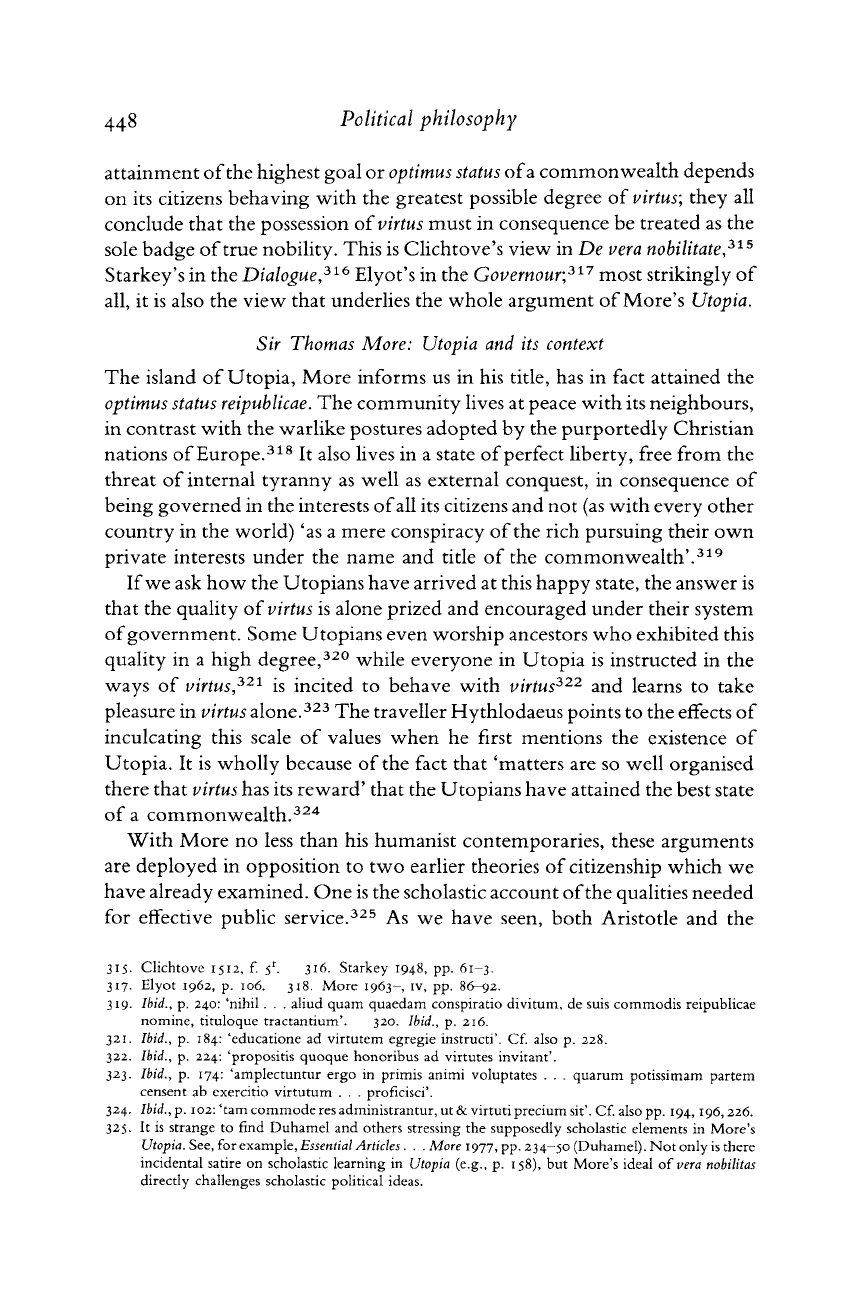
448
Political
philosophy
attainment
of
the highest goal or optimus status
of
a
commonwealth depends
on its citizens behaving with the greatest possible degree of virtus; they all
conclude that the
possession
of virtus must in consequence be treated as the
sole
badge
of
true
nobility. This is Clichtove's
view
in De
vera
nobilitate,
315
Starkey's
in the
Dialogue,
316
Elyot's in the
Governour;
317
most strikingly of
all, it is also the
view
that underlies the whole argument of
More's
Utopia.
Sir
Thomas
More:
Utopia
and its context
The
island of Utopia, More informs us in his title, has in fact attained the
optimus
status
reipublicae.
The community
lives
at peace with its neighbours,
in contrast with the warlike postures adopted by the purportedly Christian
nations
of
Europe.
318
It also
lives
in a state
of
perfect
liberty, free from the
threat
of internal tyranny as
well
as external conquest, in consequence of
being
governed in the interests
of
all its citizens and not (as with every other
country
in the world) 'as a mere conspiracy of the rich pursuing their own
private
interests under the name and title of the commonwealth'.
319
If
we ask how the Utopians have arrived at this happy state, the answer is
that
the quality of virtus is alone prized and encouraged under their system
of
government. Some Utopians even worship ancestors who exhibited this
quality in a high degree,
320
while
everyone in Utopia is instructed in the
ways of virtus,
321
is incited to behave with virtus
322
and learns to take
pleasure in virtus alone.
323
The traveller Hythlodaeus points to the effects of
inculcating this scale of values when he first mentions the existence of
Utopia. It is
wholly
because of the fact that 'matters are so
well
organised
there
that virtus has its
reward'
that the Utopians have attained the best state
of
a commonwealth.
324
With
More no
less
than his humanist contemporaries, these arguments
are
deployed in opposition to two earlier theories of citizenship which we
have already examined. One is the scholastic account
of
the qualities needed
for
effective public service.
325
As we have seen, both Aristotle and the
315.
Clichtove 1512, f. 5
r
. 316. Starkey 1948, pp. 61-3.
317.
Elyot 1962, p. 106. 318. More 1963-, iv, pp.
86-92.
319. Ibid., p. 240:
'nihil
. . .
aliud
quam
quaedam
conspiratio
divitum,
de
suis
commodis
reipublicae
nomine,
tituloque
tractantium'.
320. Ibid., p. 216.
321. Ibid., p. 184:
'educatione
ad
virtutem
egregie
instructi'.
Cf.
also
p. 228.
322. Ibid., p. 224:
'propositis
quoque
honoribus
ad
virtutes
invitant'.
323. Ibid., p. 174:
'amplectuntur
ergo
in
primis
animi
voluptates
. . .
quarum
potissimam
partem
censent
ab
exercitio
virtutum
. . .
proficisci'.
324. Ibid., p. 102:
'tarn
commode
res
administrantur,
ut &
virtuti
precium
sit'. Cf.
also
pp. 194,196, 226.
325. It is
strange
to
find
Duhamel
and
others
stressing
the
supposedly
scholastic
elements
in
More's
Utopia.
See, for
example,
Essential Articles . . . More 1977, pp.
234-50
(Duhamel).
Not
only
is
there
incidental
satire
on
scholastic
learning
in Utopia
(e.g.,
p. 158), but
More's
ideal
of vera nobilitas
directly
challenges
scholastic
political
ideas.
Cambridge Histories Online © Cambridge University Press, 2008
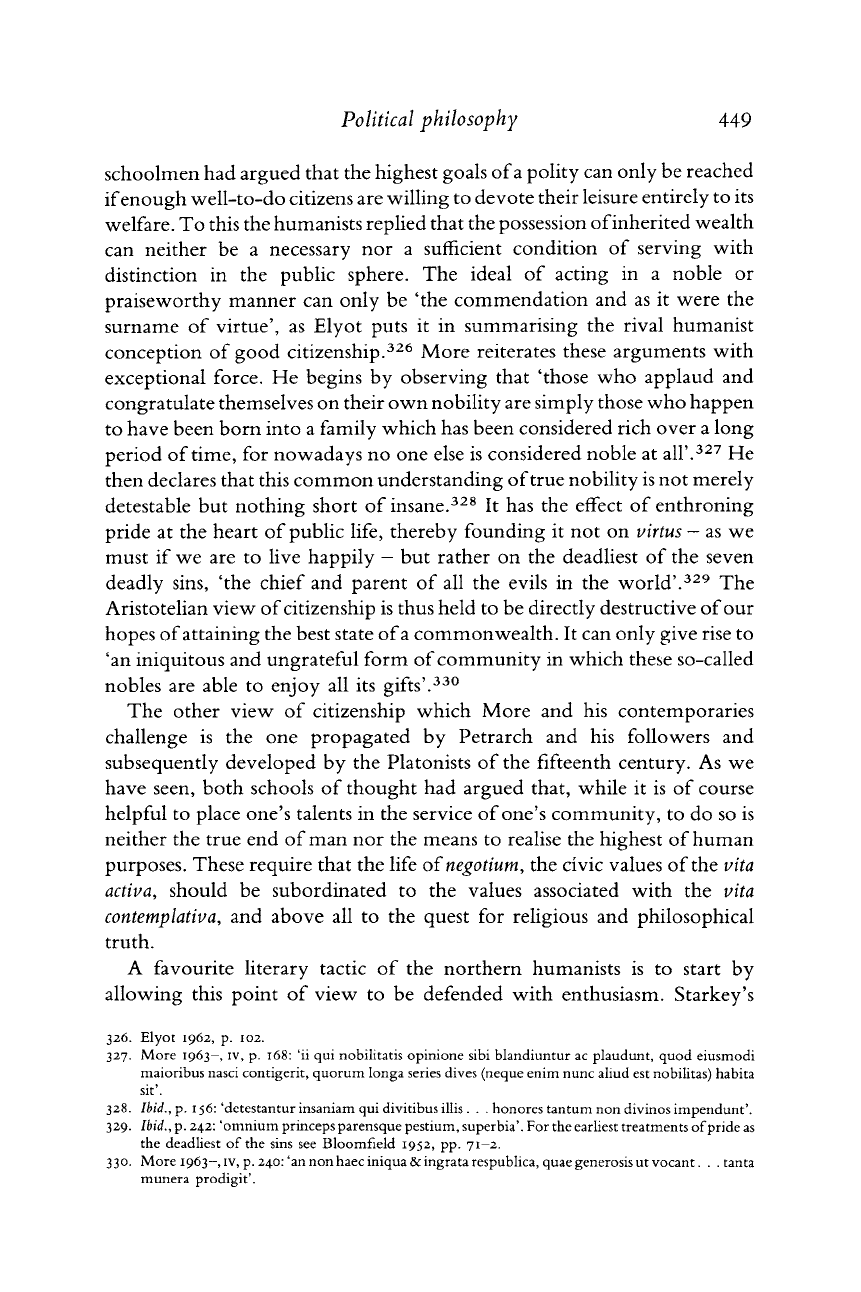
Political
philosophy
449
schoolmen had argued
that
the highest goals
of
a
polity can only be
reached
if
enough well-to-do citizens
are
willing
to devote
their
leisure entirely to its
welfare.
To this the
humanists
replied
that
the possession
of
inherited
wealth
can
neither be a necessary nor a sufficient condition of serving with
distinction in the public sphere. The ideal of acting in a noble or
praiseworthy
manner can only be 'the commendation and as it were the
surname
of virtue', as Elyot puts it in summarising the
rival
humanist
conception
of good citizenship.
326
More
reiterates
these arguments with
exceptional
force.
He begins by observing
that
'those who applaud and
congratulate
themselves on
their
own nobility
are
simply those who happen
to
have been born into a family which has been considered
rich
over a long
period
of
time,
for nowadays no one else is considered noble at all'.
327
He
then
declares
that
this common
understanding
of
true
nobility is not merely
detestable
but nothing short of insane.
328
It has the effect of enthroning
pride
at the
heart
of public life, thereby founding it not on virtus
—
as we
must
if we are to live happily
—
but
rather
on the deadliest of the seven
deadly
sins, 'the chief and
parent
of all the evils in the world'.
329
The
Aristotelian
view
of
citizenship is thus held to be directly
destructive
of
our
hopes
of
attaining
the best state
of
a
commonwealth. It can only give rise to
'an
iniquitous and ungrateful form of
community
in which these so-called
nobles are able to enjoy all its gifts'.
330
The
other view of citizenship which
More
and his contemporaries
challenge
is the one propagated by
Petrarch
and his followers and
subsequently developed by the Platonists of the fifteenth
century.
As we
have
seen, both schools of thought had argued
that,
while it is of course
helpful to place one's talents in the service of one's community, to do so is
neither
the
true
end of
man
nor the means to realise the highest of
human
purposes.
These require
that
the life of
negotiutn,
the civic values of
the
vita
activa,
should be subordinated to the values associated with the
vita
contemplativa,
and above all to the quest for religious and philosophical
truth.
A
favourite
literary
tactic
of the
northern
humanists is to
start
by
allowing this point of view to be defended with enthusiasm. Starkey's
326. Elyot 1962, p. 102.
327. More 1963-, iv, p. 168: 'ii qui
nobilitatis
opinione
sibi
blandiuntur ac plaudunt, quod
eiusmodi
maioribus
nasci
contigerit, quorum longa
series
dives
(neque
enim
nunc
aliud est
nobilitas)
habita
sit'.
328. Ibid., p. 156: 'detestantur
insaniam
qui divitibus
illis.
. .
honores
tantum non
divinos
impendunt'.
329. Ibid., p. 242:
'omnium
princeps parensque
pestium,
superbia'. For the
earliest
treatments
of pride as
the
deadliest
of the
sins
see
Bloomfield
1952, pp. 71-2.
330. More 1963-, iv, p. 240:'annonhaeciniqua&ingratarespublica,
quaegenerosis
ut vocant. . . tanta
munera prodigit'.
Cambridge Histories Online © Cambridge University Press, 2008
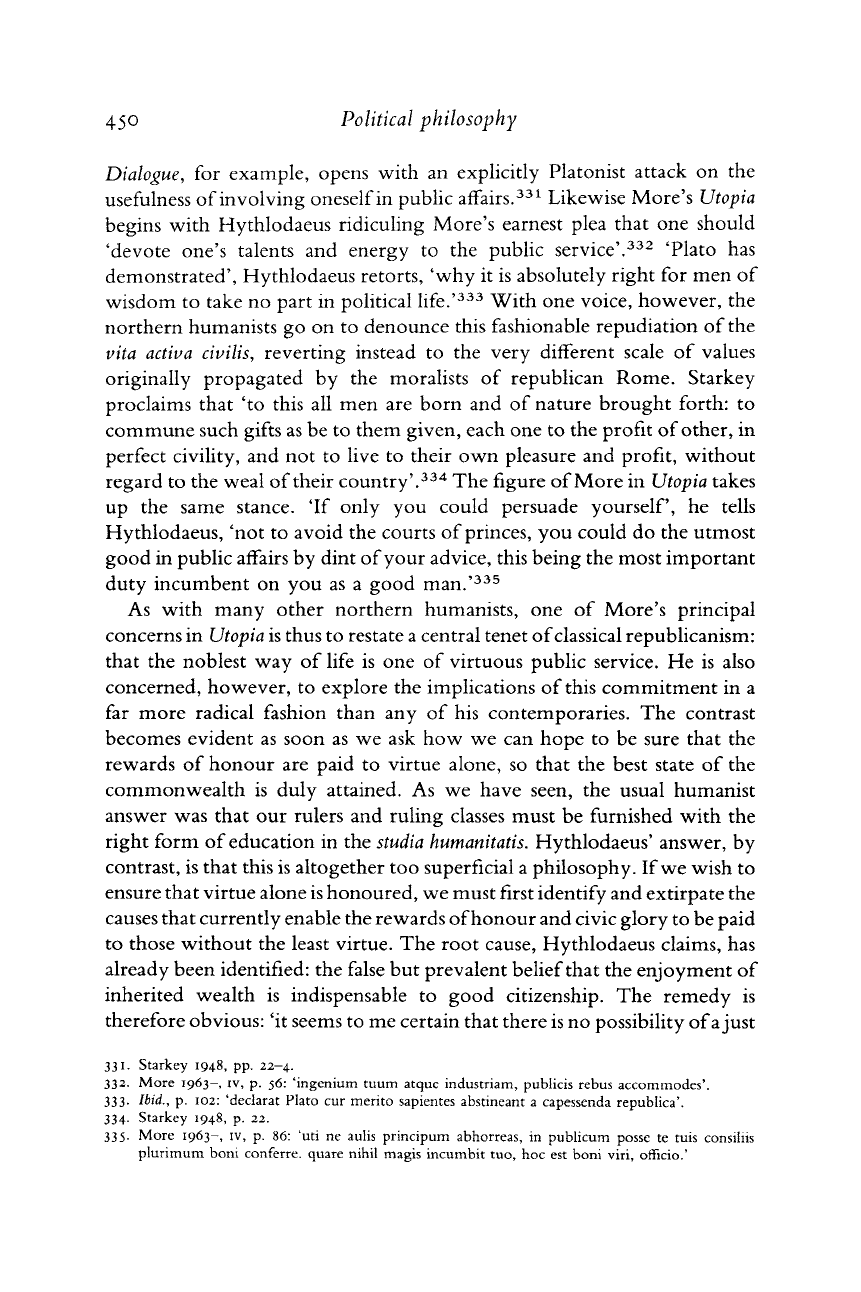
450
Political
philosophy
Dialogue,
for example, opens with an explicitly Platonist
attack
on the
usefulness
of
involving oneself in public affairs.
331
Likewise More's
Utopia
begins with Hythlodaeus ridiculing More's earnest plea that one should
'devote one's talents and energy to the public service'.
332
'Plato has
demonstrated',
Hythlodaeus
retorts,
'why it is absolutely right for men of
wisdom to take no
part
in political life.'
333
With one voice, however, the
northern
humanists go on to denounce this fashionable repudiation of the
vita
activa
civ
His,
reverting instead to the very different scale of values
originally propagated by the moralists of republican Rome. Starkey
proclaims
that 'to this all men are born and of
nature
brought forth: to
commune
such gifts as be to them given, each one to the profit of
other,
in
perfect
civility, and not to
live
to their own pleasure and profit, without
regard
to the weal of
their
country'.
334
The figure of
More
in
Utopia
takes
up the same stance. 'If only you could persuade yourself, he tells
Hythlodaeus, 'not to avoid the courts of
princes,
you could do the utmost
good in public affairs by dint
of
your
advice, this being the most important
duty incumbent on you as a good man.'
335
As with many other northern humanists, one of More's principal
concerns
in
Utopia
is thus to
restate
a
central
tenet
of
classical
republicanism:
that
the noblest way of
life
is one of virtuous public service. He is also
concerned,
however, to explore the implications of this commitment in a
far
more radical fashion than any of his contemporaries. The contrast
becomes evident as soon as we ask how we can hope to be sure that the
rewards
of honour are paid to virtue alone, so that the best state of the
commonwealth is duly attained. As we have seen, the usual humanist
answer
was that our rulers and ruling classes must be furnished with the
right
form of education in the
studia
humanitatis.
Hythlodaeus' answer, by
contrast,
is that this is altogether too superficial a philosophy.
If
we
wish
to
ensure
that virtue alone is honoured, we must first identify and
extirpate
the
causes that
currently
enable the
rewards
of
honour
and civic glory to be paid
to
those without the least virtue. The root cause, Hythlodaeus claims, has
already
been identified: the false but prevalent belief
that
the enjoyment of
inherited wealth is indispensable to good citizenship. The remedy is
therefore
obvious: 'it seems to me certain that there is no possibility
of
a
just
331.
Starkey 1948, pp. 22-4.
332. More 1963-, iv, p. 56:
'ingenium
tuum
atque
industriam,
publicis
rebus
accommodes'.
333. Ibid., p. 102: 'declarat Plato cur
mérito
sapientes
abstineant
a
capessenda
república'.
334. Starkey 1948, p. 22.
335. More 1963-, iv, p. 86: 'uti ne
aulis
principum
abhorreas,
in
publicum
posse
te
tuis
consiliis
plurimum
boni
conferre.
quare
nihil
magis
incumbit
tuo, hoc est
boni
viri,
officio.'
Cambridge Histories Online © Cambridge University Press, 2008
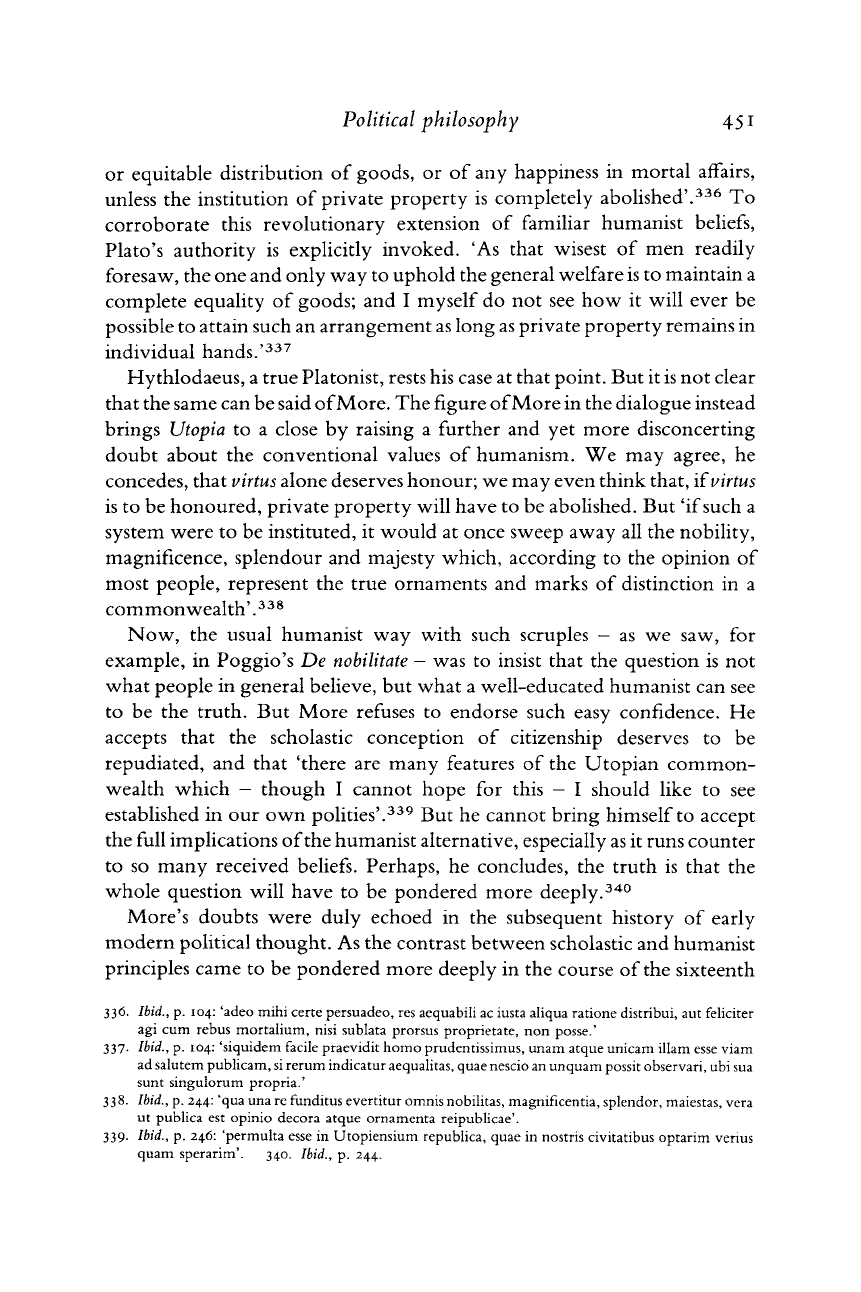
Political
philosophy
451
or
equitable distribution of goods, or of any happiness in mortal affairs,
unless the institution of private property is completely abolished'.
336
To
corroborate
this revolutionary extension of familiar humanist beliefs,
Plato's
authority is explicitly invoked. 'As that
wisest
of men readily
foresaw, the one and only way to uphold the general welfare is to maintain a
complete equality of goods; and I myself do not see how it
will
ever be
possible to attain such an
arrangement
as
long
as private property remains in
individual hands.'
337
Hythlodaeus, a true Platonist, rests his case at that point. But it is not clear
that
the same can be said
of
More.
The figure
of
More
in the dialogue instead
brings
Utopia
to a close by raising a further and yet more disconcerting
doubt about the conventional values of humanism. We may agree, he
concedes, that virtus alone deserves honour; we may even think that,
if
virtus
is to be honoured, private property
will
have to be abolished. But
'if
such a
system were to be instituted, it would at once
sweep
away all the nobility,
magnificence, splendour and majesty which, according to the opinion of
most people, represent the true ornaments and marks of distinction in a
commonwealth'.
338
Now, the usual humanist way with such scruples
—
as we saw, for
example,
in Poggio's De
nobilitate
—
was to insist that the question is not
what people in general believe, but what a well-educated humanist can see
to
be the
truth.
But More refuses to endorse such easy confidence. He
accepts
that the scholastic conception of citizenship deserves to be
repudiated,
and that 'there are many features of the Utopian common-
wealth which
—
though I cannot hope for this
—
I should
like
to see
established in our own polities'.
339
But he cannot bring himself to accept
the
full
implications
of
the humanist alternative, especially as it runs counter
to
so many received beliefs. Perhaps, he concludes, the truth is that the
whole question
will
have to be pondered more deeply.
340
More's
doubts were duly echoed in the subsequent history of early
modern political thought. As the contrast between scholastic and humanist
principles came to be pondered more deeply in the course of the sixteenth
336. Ibid., p. 104:
'adeo
mihi certe
persuadeo,
res
aequabili
ac
iusta
aliqua
ratione
distribui,
aut
feliciter
agi cum
rebus
mortalium,
nisi
sublata
prorsus
proprietate,
non
posse.'
337. Ibid., p. 104:
'siquidem
facile
praevidit
homo
prudentissimus,
unam
atque
unicam
illam
esse
viam
ad
salutem
publicam,
si
rerum
indicatur
aequalitas,
quae
nescio
an
unquam
possit
observari,
ubi sua
sunt
singulorum
propria.'
338. Ibid., p. 244: 'qua una re
funditus
evertitur
omnis
nobilitas,
magnificentia,
splendor,
maiestas,
vera
ut
publica
est
opinio
decora
atque
ornamenta
reipublicae'.
339. Ibid., p. 246:
'permulta
esse
in
Utopiensium
republica,
quae
in
nostris
civitatibus
optarim
verius
quam
sperarim'.
340. Ibid., p. 244.
Cambridge Histories Online © Cambridge University Press, 2008
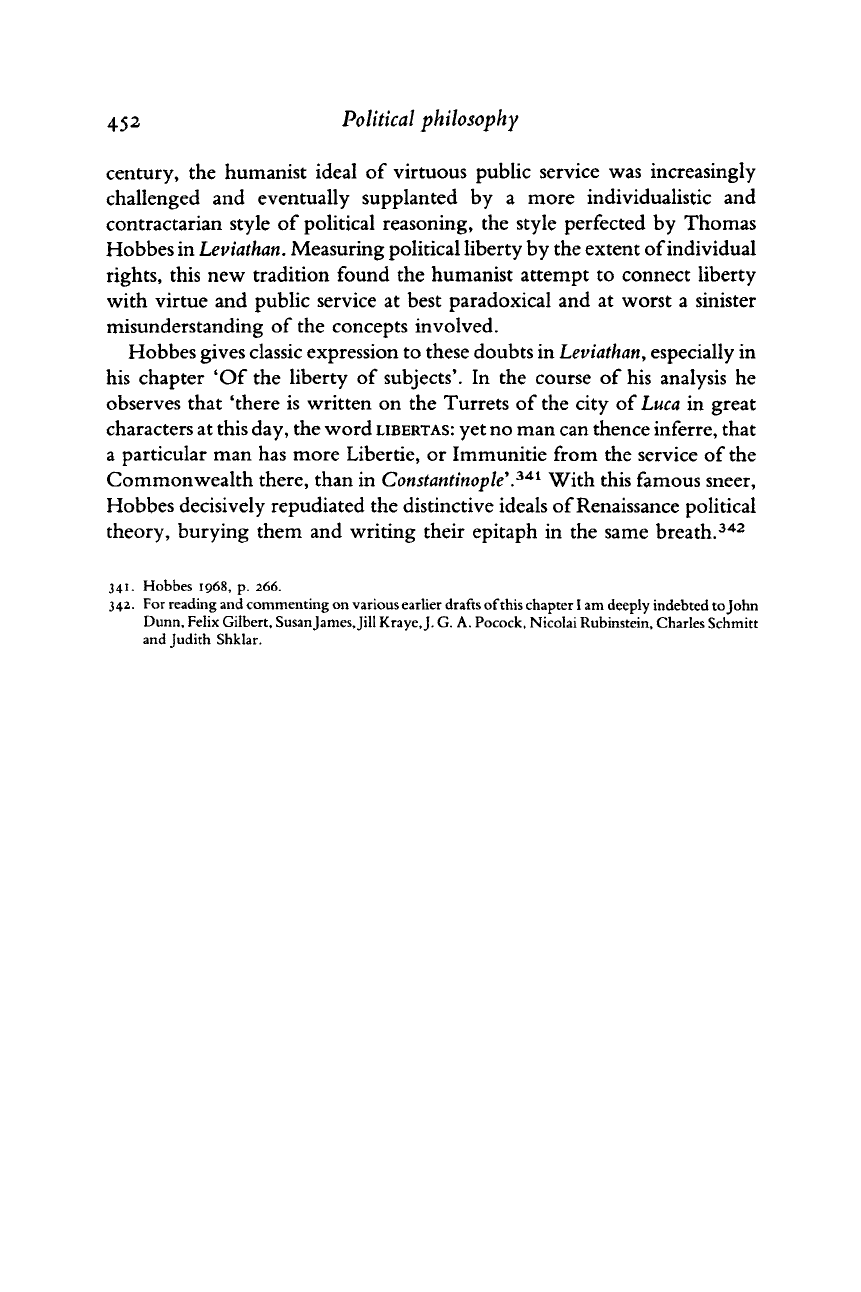
452
Political philosophy
century,
the humanist ideal of virtuous public service was increasingly
challenged and eventually supplanted by a more individualistic and
contractarian
style of political reasoning, the style perfected by Thomas
Hobbes in
Leviathan.
Measuring political liberty by the extent of
individual
rights,
this new tradition found the humanist attempt to connect liberty
with virtue and public service at best paradoxical and at worst a sinister
misunderstanding of the concepts involved.
Hobbes gives classic expression to these doubts in
Leviathan,
especially in
his chapter 'Of the liberty of subjects'. In the course of his analysis he
observes that 'there is written on the Turrets of the city of
Luca
in great
characters
at
this
day,
the word
LIBERTAS:
yet no man can thence inferre, that
a particular man has more Libertie, or Immunitie from the service of the
Commonwealth
there, than in
Constantinople'
3
*
1
With this famous sneer,
Hobbes decisively repudiated the distinctive ideals of Renaissance political
theory, burying them and writing their epitaph in the same breath.
342
341.
Hobbes 1968, p. 266.
342. For reading and
commenting
on various
earlier
drafts of
this
chapter I am deeply
indebted
to
John
Dunn, Felix Gilbert,
Susan
James, Jill
Kraye,
J.
G. A. Pocock, Nicolai Rubinstein, Charles Schmitt
and Judith Shklar.
Cambridge Histories Online © Cambridge University Press, 2008
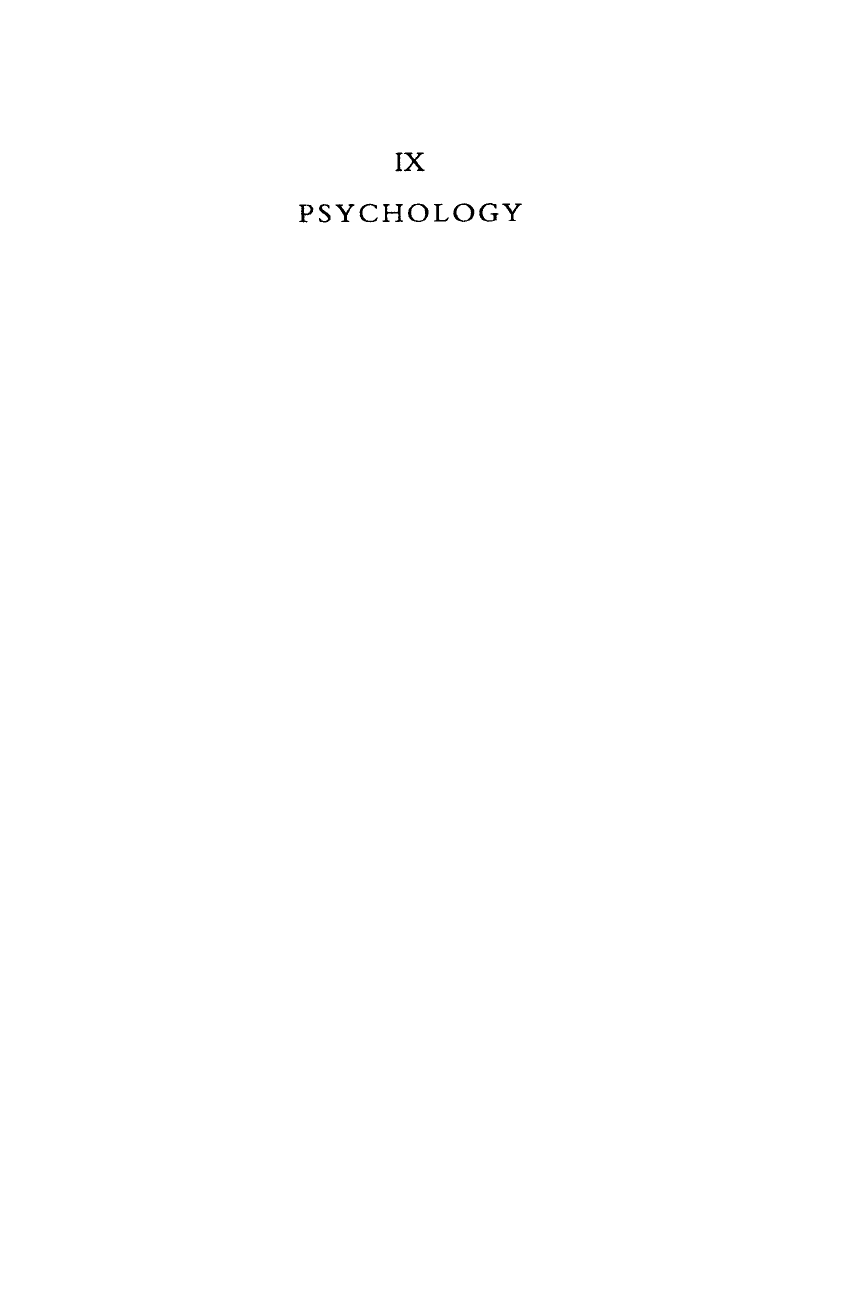
IX
PSYCHOLOGY
Cambridge Histories Online © Cambridge University Press, 2008

Cambridge Histories Online © Cambridge University Press, 2008
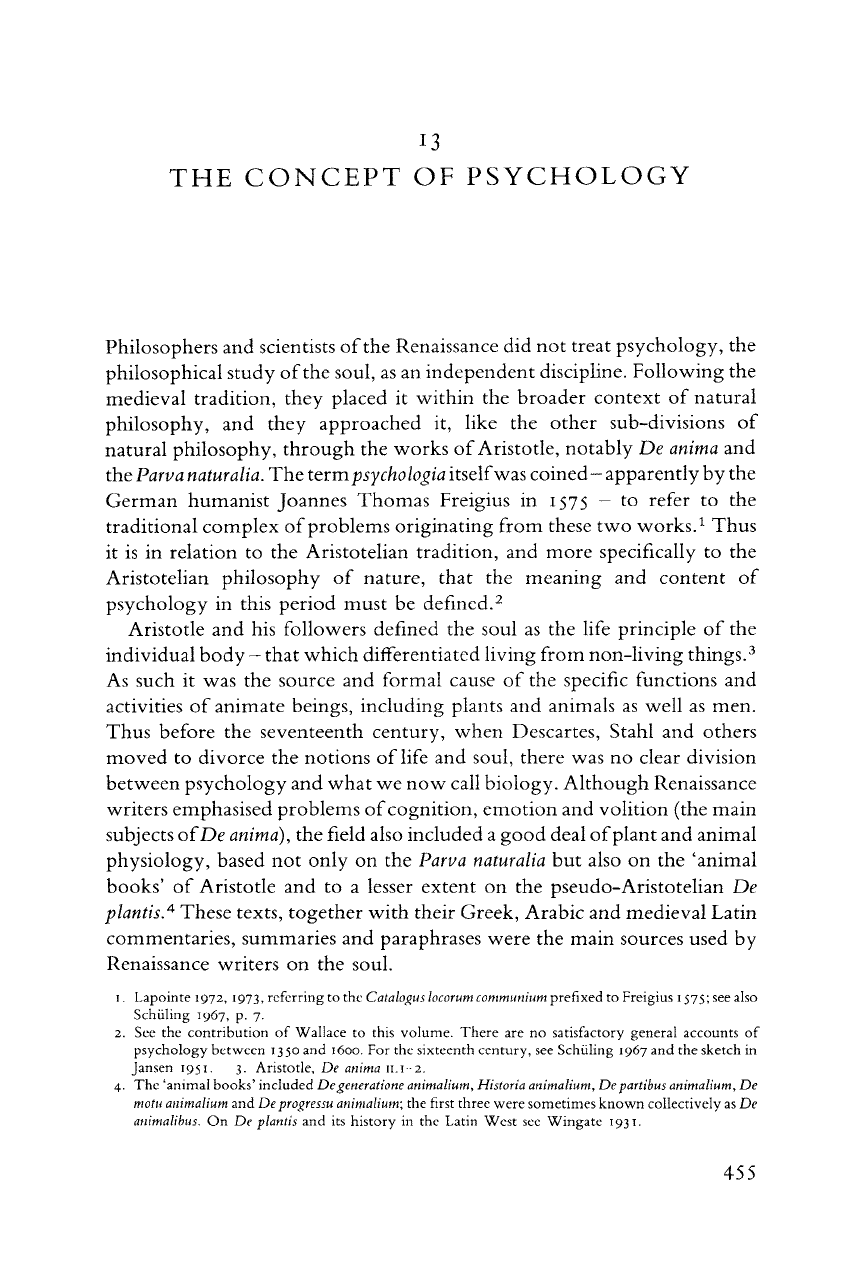
13
Philosophers and scientists of the Renaissance did not
treat
psychology, the
philosophical study
of
the soul, as an independent discipline. Following the
medieval tradition, they placed it within the broader context of natural
philosophy, and they approached it,
like
the other sub-divisions of
natural
philosophy, through the works of
Aristotle,
notably De
anima
and
the
Parva
naturalia.
The
term
psychologia
itself was coined-
apparently
by the
German
humanist Joannes Thomas Freigius in 1575 — to refer to the
traditional
complex of problems originating from these two works.
1
Thus
it is in relation to the Aristotelian tradition, and more specifically to the
Aristotelian philosophy of nature, that the meaning and content of
psychology in this period must be defined.
2
Aristotle and his followers defined the soul as the
life
principle of the
individual body
—
that which differentiated
living
from
non-living
things.
3
As such it was the source and formal cause of the specific functions and
activities of animate beings, including plants and animals as
well
as men.
Thus before the seventeenth century, when Descartes, Stahl and others
moved to divorce the notions of
life
and soul, there was no clear
division
between psychology and what we now call biology. Although Renaissance
writers
emphasised problems
of
cognition, emotion and volition (the main
subjects
of
De
anima),
the
field
also included a good deal
of
plant and animal
physiology, based not only on the
Parva
naturalia
but also on the 'animal
books' of Aristotle and to a lesser extent on the pseudo-Aristotelian De
plantis.
4
These texts, together with their Greek, Arabic and medieval Latin
commentaries,
summaries and paraphrases were the main sources used by
Renaissance writers on the soul.
1.
Lapointe 1972, 1973, referring to the Catalogus locorum communium prefixed to Freigius 1575; see also
Schilling
1967, p. 7.
2. See the contribution of Wallace to this volume. There are no satisfactory general accounts of
psychology
between 1350 and 1600. For the sixteenth century, see Schilling 1967 and the sketch in
Jansen
1951. 3. Aristotle, De anima
11.1—2.
4. The 'animal books' included Degeneratione animalium, Historia animalium, Departibus animalium, De
motu animalium and De progressu animalium; the first three were sometimes known
collectively
as De
animalibus. On De plantis and its history in the Latin West see Wingate 1931.
455
THE
CONCEPT OF PSYCHOLOGY
Cambridge Histories Online © Cambridge University Press, 2008
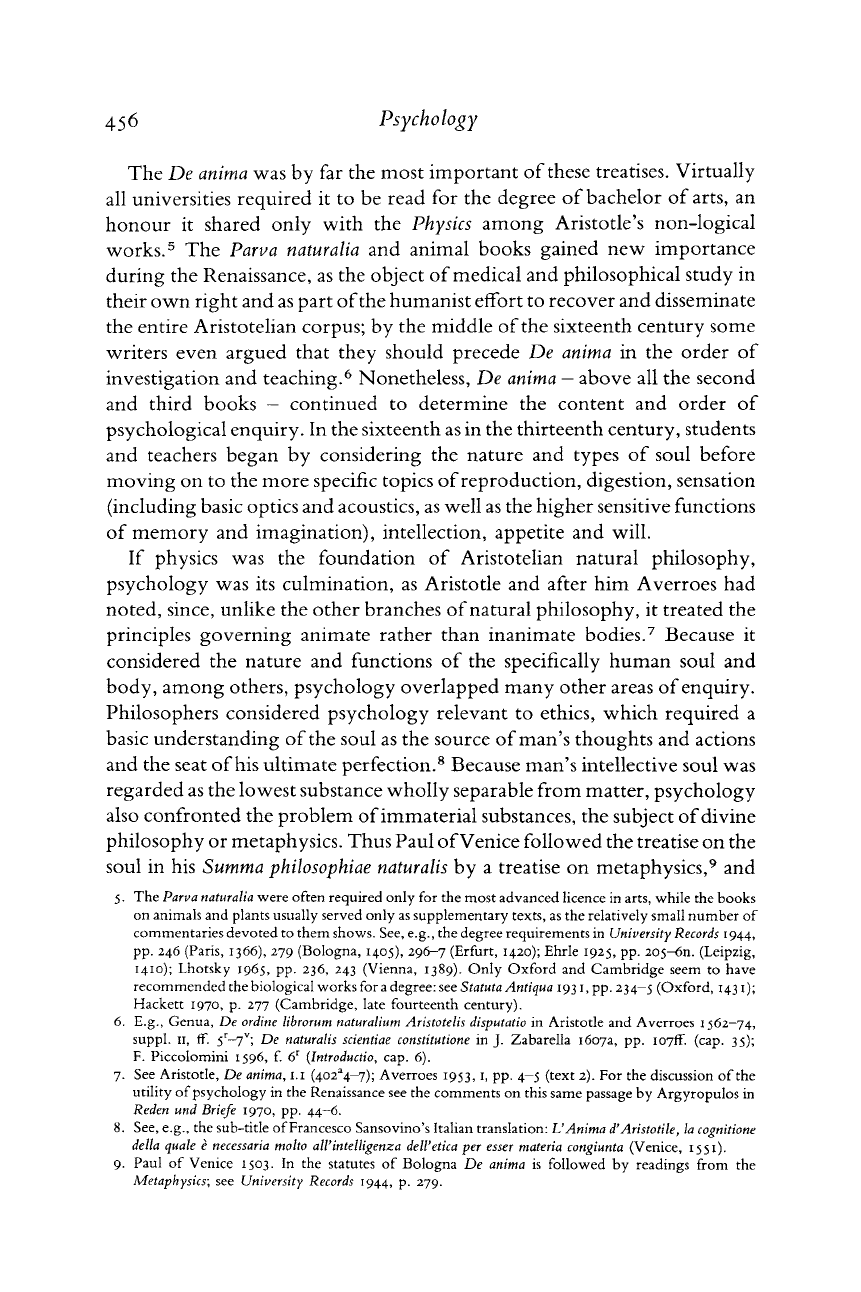
456
Psychology
The
De
anima
was by far the most important of these treatises. Virtually
all universities required it to be read for the degree of bachelor of
arts,
an
honour it shared only with the
Physics
among Aristotle's non-logical
works.
5
The
Paw
a
naturalia
and animal books gained new importance
during the Renaissance, as the object of medical and philosophical study in
their
own right and as
part
of
the humanist effort to recover and disseminate
the entire Aristotelian corpus; by the middle
of
the sixteenth century some
writers
even argued that they should precede De
anima
in the order of
investigation and teaching.
6
Nonetheless, De
anima
—
above all the second
and third books — continued to determine the content and order of
psychological enquiry. In the sixteenth
as
in the thirteenth century, students
and teachers began by considering the nature and types of soul before
moving on to the more specific topics
of
reproduction,
digestion, sensation
(including basic optics and acoustics, as
well
as the higher sensitive functions
of
memory and imagination), intellection, appetite and
will.
If
physics was the foundation of Aristotelian natural philosophy,
psychology was its culmination, as Aristotle and after him Averroes had
noted, since, unlike the other branches
of
natural
philosophy, it treated the
principles governing animate
rather
than inanimate bodies.
7
Because it
considered the nature and functions of the specifically human soul and
body, among others, psychology overlapped many other areas
of
enquiry.
Philosophers considered psychology relevant to ethics, which required a
basic understanding of the soul as the source
of
man's thoughts and actions
and the seat
of
his ultimate perfection.
8
Because man's intellective soul was
regarded
as the lowest substance
wholly
separable from
matter,
psychology
also confronted the problem
of
immaterial
substances, the subject
of
divine
philosophy or metaphysics. Thus Paul
of
Venice
followed
the treatise on the
soul in his Summa
philosophiae
naturalis
by a treatise on metaphysics,
9
and
5. The Parva naturalia
were
often
required
only
for the
most
advanced
licence
in arts,
while
the
books
on
animals
and
plants
usually
served
only
as
supplementary
texts,
as the
relatively
small
number
of
commentaries
devoted
to
them
shows.
See, e.g., the
degree
requirements
in University Records 1944,
pp. 246
(Paris,
1366),
279
(Bologna,
1405),
296-7
(Erfurt,
1420);
Ehrle 1925, pp.
205~6n.
(Leipzig,
1410); Lhotsky 1965, pp. 236, 243
(Vienna,
1389).
Only Oxford and Cambridge
seem
to
have
recommended
the
biological
works
for
a
degree:
see Statuta Antiqua 1931, pp.
234-5
(Oxford, 1431);
Hackett 1970, p. 277 (Cambridge,
late fourteenth
century).
6. E.g., Genua, De ordine librorum naturalium Aristotelis disputatio in
Aristotle
and
Averroes
1562-74,
suppl.
11, ff. 5
r
~7
v
; De naturalis scientiae constitutione in J. Zabarella 1607a, pp.
I07ff.
(cap. 35);
F.
Piccolomini
1596, f. 6
r
(Introductio, cap. 6).
7. See
Aristotle,
De anima, 1.1
(402
a
4-7);
Averroes
1953,1, pp. 4-5
(text
2). For the
discussion
of the
utility
of
psychology
in the
Renaissance
see the
comments
on
this
same
passage
by Argyropulos in
Reden
und Briefe 1970, pp.
44—6.
8. See, e.g., the
sub-title
of
Francesco
Sanso
vino's
Italian
translation:
L'Anima d'Aristotile, la cognitione
della
quale e necessaria molto alVintelligenza dell'etica per esser materia congiunta
(Venice,
1551).
9. Paul of
Venice
1503. In the
statutes
of
Bologna
De anima is
followed
by
readings
from
the
Metaphysics;
see University Records 1944, p. 279.
Cambridge Histories Online © Cambridge University Press, 2008
